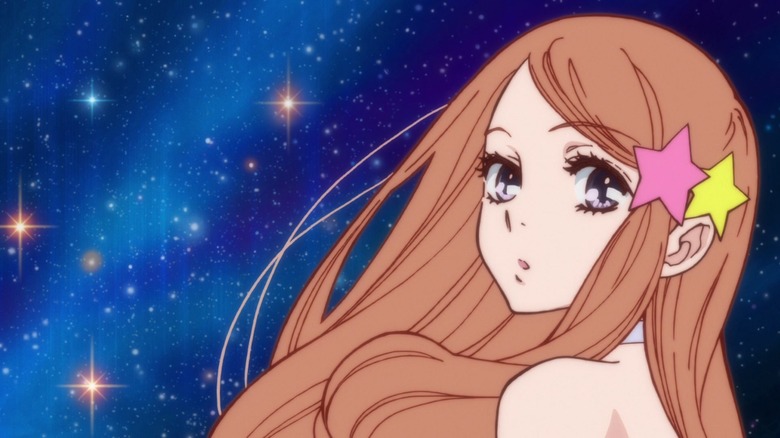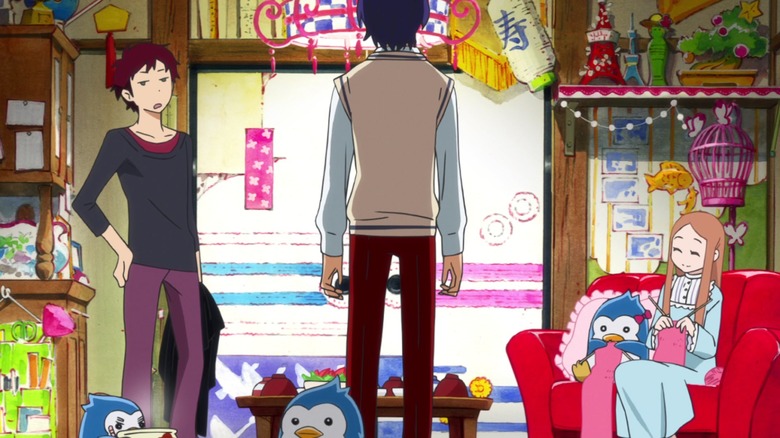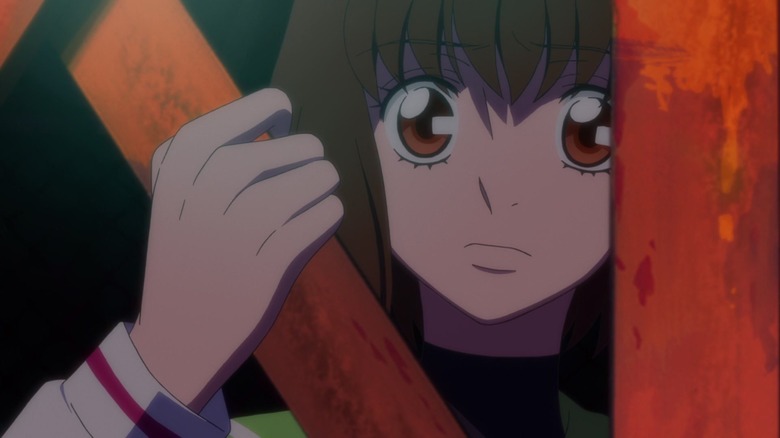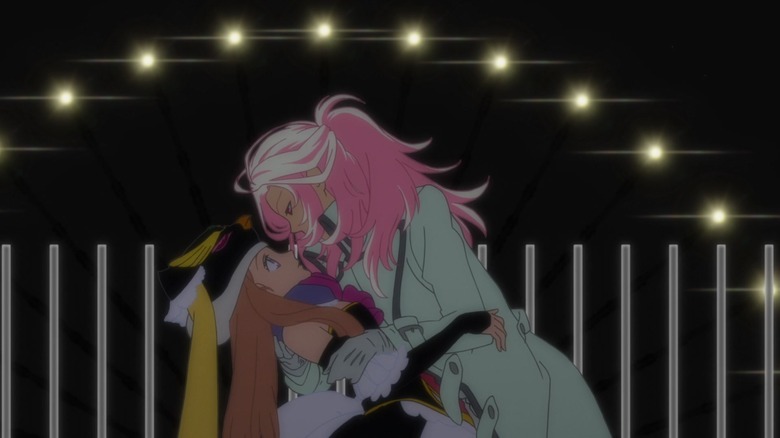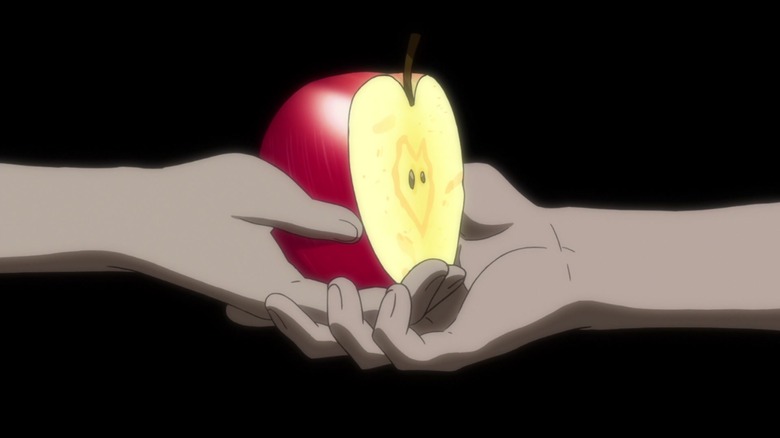The Daily Stream: Penguindrum Will Show You Fate Can Be Changed
(Welcome to The Daily Stream, an ongoing series in which the /Film team shares what they've been watching, why it's worth checking out, and where you can stream it.)
The Series: "Penguindrum"
Where You Can Stream It: HIDIVE
The Pitch: Kanba, Shouma, and Himari Takakura are siblings living by themselves in Tokyo. When Himari dies one day at the aquarium from a long-gestating terminal illness, a mysterious penguin hat from the gift shop resurrects and possesses her. Calling herself the Princess of the Crystal, the reanimated Himari demands that Kanba and Shouma locate the mysterious Penguindrum. But what and where could it be? With the help of three mysterious penguins that only they can see, Kanba and Shouma venture into the underworld of modern Japan to save Himari's life. The people they find there, and the cruelties they unearth, reveal a bloody secret that binds their family to the fate of two others, and to a turning point in Japanese history.
In this melodramatic suspense thriller that borrows heavily from the works of David Lynch and Haruki Murakami, a lost generation of teenagers and young adults struggle against a world that has abandoned them. Can fate be changed? One thing is certain; ever since the day they were born, Shouma says, "none of us had a future and the only certain thing is that we wouldn't amount to anything."
Why it's essential viewing
The beginning of "Penguindrum" is all sweetness and light. Beautifully detailed and lived-in backgrounds, expressive drawings, and moments of humor ground us in the day-to-day life of the Takakura siblings. By the time that the first shoe drops and Himari collapses at the aquarium, the viewer knows exactly what is at stake and what all three of them would lose if their family were to shatter. The show never once loses sight of the Takakuras, even as it grows into something bigger, stranger, and scarier than you might have expected going in. This is a story about incest, stalkers, teenagers behaving badly, real or pretended amnesia, sexual assault, diaries that determine the future, Japanese idol culture and the 1995 Sarin gas attack perpetrated in the Tokyo subways by terrorism group Aum Shinrikyo. "Penguindrum" is a show about found families that asks the question, "how are found families created? How are they destroyed?" You may find that you do not want to know the answer.
The director of "Penguindrum," Kunihiko Ikuhara, had left the anime industry for over a decade after directing two seasons of "Sailor Moon" and his masterpiece "Revolutionary Girl Utena." "Penguindrum" was his grand return to animation, a place to put every single idea that had come to mind in the years since. Joining him was an all-star group of artists including director Shouko Nakamura, art designer Chieko Nakamura and character designers Lily Hoshino and Terumi Nishii. At a luxurious 24 episodes, the series bursts at the seams with character and incident. Future series directed by Ikuhara like "Yuri Bear Storm" and "Sarazanmai" would be similarly imaginative, but neither would last as long or look as consistently good as "Penguindrum" did on a weekly basis.
Nothing in this world is pointless
The character who best sums up Penguindrum's unique blend of appeal and frustration is Ringo Oginome. Ringo is a seemingly ordinary teenage girl who Shouma and Kanba are commanded to stalk by the Princess of the Crystal. Shouma soon discovers that Ringo is anything but ordinary. In fact, she herself is a stalker obsessed with sleeping with Shouma's homeroom teacher Keiju Tabuki. Ringo is initially annoying and unsympathetic. She physically and verbally abuses Shouma, moons over Tabuki constantly and even plots to destroy Tabuki's girlfriend, the popular actress Yuri Tokikago. Yet as the series continues, we learn that Ringo is acting out for a reason. Her parents are on the verge of a messy divorce, and Ringo can't help but believe that the death of sister Momoka is to blame. The only way to repair the cycle of grief that began with her sister's death, she believes, is to take Momoka's place.
By befriending the Takakura siblings, Ringo grows into her own person without losing her headstrong nature. But by the time she accomplishes this, every other character is falling to pieces. Kanba, the older brother, falls under the sway of doctor and terrorist Sanetoshi Watase to pay for Himari's medication. Himari struggles against forces of life and death that restrict her agency at every turn. Tabuki and Yuri seek vengeance against the Takakura family, who they believe to be responsible for Momoka's death and everything terrible that has happened since. Through weekly interlocking flashbacks, "Penguindrum" reveals to its audience that every member of its cast has done something to selfishly hurt somebody else. Violence repeats, children are punished for the sins of their parents and are compelled to reenact those behaviors.
The destination of your fate
That sense of selfishness is inseparable from "Penguindrum" itself. In an interview in the magazine Eureka, Ikuhara discusses his drive to write flawed, unlikable characters. "Betraying their friends or clearly opposing society; it's in this foolishness that love can be felt." The cast of "Penguindrum" all want things, or think that they should want things, they cannot have. That drive, their "survival tactic," leads them to make decisions that viewers may find horrifying or stupid. Speaking personally, though, I can't help but find that refreshing. Plenty of great anime has followed in the footsteps of "Utena," but few have allowed their characters to be as mean to each other. In those moments when characters like Ringo and Kanba express genuine love, hurt and fear, the dazzling artifice of "Penguindrum" is shattered to reveal a very human ugliness.
It takes a dedicated viewer to make it that far, because "Penguindrum" demands close viewing. The series casually drops references to Haruki Murakami stories like "Super-Frog Saves Tokyo" and Kenji Miyazawa's children's novel "Night on the Galactic Railroad," and expects the audience to keep up. Its soundtrack remixes rock songs by classic band ARB as peppy idol tunes sung by diagetic duo TRIPLE H. Company logos, subway advertisements and seemingly pointless conversations hide secrets you may only catch on a rewatch. Even those viewers who obsess over each and every detail may be frustrated by how many just don't pay off. Characters hinted to be pivotal are quickly shuffled off the stage by the climax, and many key mysteries remain unexplained. A more disciplined draft of "Penguindrum" could have cut or refined these elements, but "Penguindrum" was anything but a disciplined production; this is the show's great strength and weakness.
A universe in the palm of your hand
"Penguindrum" owes its greatest debt to David Lynch and Mark Frost's classic mystery soap opera "Twin Peaks." The series quotes the Laura Palmer theme in its soundtrack. It centers an existential mystery around a young woman whose death exposes her community's hypocrisies. Key Lynchian motifs like curtains, shadow worlds, and ghosts are repurposed. "Penguindrum" embraces the melodrama that propels daily soaps; it gleefully hides essential information from the audience only to reveal it at the most upsetting moment possible. And of course, both "Penguindrum" and "Twin Peaks" make choices that are frankly in bad taste. Just as there are scenes in "Twin Peaks" that come off as baffling and offensive today, there are scenes in "Penguindrum" that the staff should have left back in the '90s during the production of "Utena."
There are folks who find shows like "Twin Peaks" and "Penguindrum" to be inaccessible. But I think these claims are often overblown. Lynch's work at its root is about sensation, subjecting the audience through visuals and sound design to overwhelming feelings they might not understand in the moment. "Penguindrum" is similarly concerned with making its audience laugh, cry or scream. The show's best moments are not to be found in plot twists, but explosions of emotional catharsis that leave you shaken. Not everybody wants to experience something like that, when the world today is complicated enough. But with this year's release of a new film compilation project, 11 years after its airing, there has never been a better time to ride this runaway train to its destination.
